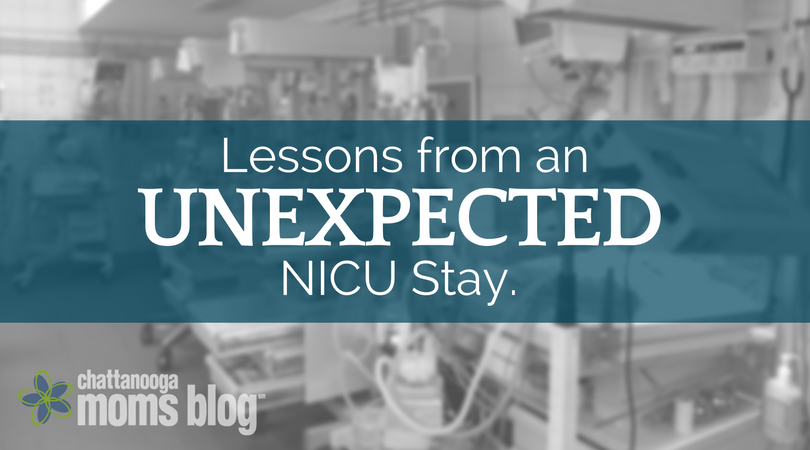Wh-whump. Wh-whump. Wh-whump.
The rhythmic beat of my breast pump cuts through the quiet as I grip the bottles and try to stay awake. I’m huddled under a blanket in the dark, while the rest of my family sleeps. It’s 2am. My four-day old baby is somewhere else.
I’ve realized that anytime I do something successfully more than once, a dangerous smugness sets in. Prior to the birth of my third son, via my third C-section, I was needless to say, not really sweating it. In fact I was about 300 times more concerned about who would care for my older kids and my annoying dog while I was in the hospital than I was about the fact I was about to be cut open and have a tiny person yanked out.
Then Rhett was born.
He was chubby and beautiful and looked exactly like his oldest brother, but something just wasn’t right. He wasn’t the same as his brothers. As I held him for the first time, he was fussy and pale and no matter how much it seemed like he wanted to, he couldn’t nurse for very long.
Even though I wanted to ignore what I knew, I knew enough to know it wasn’t normal.
So, the nurses whisked him away and he eventually ended up in the NICU. The doctors said he either had underdeveloped lungs or had somehow contracted pneumonia in utero. They said his condition was common, but not normal and gave me no real time frame of how long he might stay in the hospital. I, stupidly, thought that meant he would be discharged in a couple days with me, like his brothers had been.
I didn’t even entertain the possibility that, unlike the other times, I’d be heading home baby-less.
About eight hours after he was born, I forced myself to pretend that my abdomen hadn’t recently been sliced open, and limped my way down to the NICU. My husband had gone home to be with our older boys and I didn’t want to have to rely on the nurses to wheel me down every time I went to see Rhett.
And I wasn’t prepared for what I saw.
A CPAP mask to help him breathe covered his nose, a feeding tube secured onto his cheek with surgical tape snaked down his throat and an IV pierced his tiny hand, attaching him to all manner of different tubes. Pulse, oxygen and heart rate sensors stuck to his chest, causing the machines next to him to sound an alarm anytime he moved the wrong way. Because of the mass of wires, I couldn’t pick him up to rock or nurse him when he cried. All I could do was rub his cheek, whisper into his ear and change his diaper when the nurse gave me permission. I felt virtually useless as a mother. Remembering what my experiences had been with my older kids made his time in the NICU that much harder. Their first days were filled with nothing but quiet and snuggles and comfort.
Rhett’s were filled with alarms and needles and the smell of surgical tape. Just like that breast pump that seemed to now be permanently attached to my body, our first week together felt harsh and loud and mechanical.
On the third day, his lung collapsed and I cried so hard I couldn’t breathe. The doctors and nurses weren’t worried, because as they told me in the beginning, his condition was common and compared to the two-pound baby who had just been admitted next to him, not all that serious.
After two nights I let them discharge me, because it was clear Rhett wouldn’t be let go any time soon. Looking at this child who I had grown in my body for nine months and had a biological imperative to care for, and then leaving him to be cared for by strangers, was the most painful thing I’ve ever done. As I sat on the couch at home with my older boys, I started to cry. My confused four year old, who had been so excited about his new baby brother, hugged my still somewhat swollen belly, like he had when I had been pregnant. He thought I hadn’t had the baby yet, because there was no baby there.
The next week was spent constantly going back and forth between home and the hospital. Parents can visit the NICU any time of day other than during the two shift changes, so I tried to stay with Rhett as much as I could while not completely neglecting my other children. The ritual of checking in became part of my muscle memory: pick up the phone outside the front door, say ‘It’s Rhett’s mom’ when the nurse picks up, put away cell phone, wash hands up to the elbow for 30 seconds. He slept all the time and until the last couple days, I wasn’t allowed to nurse him, so I mostly just sat and watched him, rubbing his belly when he started to breathe too fast and listening to the shrill cries of the other babies.
I hated everything about being there besides being next to Rhett, but I felt guilty if I wasn’t there all the time.
After nine days he was given the all-clear to leave. I realize that nine days is a ridiculously short stay in the NICU compared to the majority of babies who are in there and as we left, I felt lucky in a way I’d never even imagined I could before this experience.























Thank you so much for sharing. I’m also a NICU Mom, my middle son spent 101 days in the NICU and my youngest just recently spent 66. It’s surely tough.
Thank YOU for sharing as well! That must have been so difficult to go through twice.
Comments are closed.